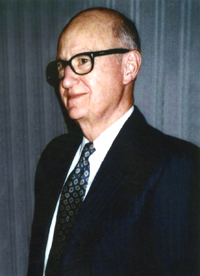
Joseph F. Mulligan was one of the founding members of the Physics Dept at UMBC. He and his work are remembered & acknowledged at UMBC via the annual “Mulligan Memorial Lecture.”
Prof. Mulligan joined the newly-founded UMBC in 1968. He served as the UMBC Dean for Graduate Studies and Research from 1968 to 1982, and as acting Chair of the UMBC Physics Dept from 1987-1988. In 1989 he was made Professor Emeritus of Physics at UMBC.
Education
Ph.D. Theoretical Physics, Catholic University of America, 1951
M.A. Philosophy, Boston College, 1946
B.A. Physics, Boston College, 1945
Previous Experience
Joseph F. Mulligan was born in New York City in 1920, attended Fordam University, and later Boston College from which he received his B.A. & M.A. degrees. His graduate work was performed at The Catholic University of America from which he received a Ph.D. in theoretical physics in 1951. After further studies in Germany, he joined the Physics faculty at Fordham Univ. in 1955. From 1956 to 1964 he served as chairman of the Physics Dept at Fordham, and from 1964 to 1967 as Dean of the Fordham Graduate School of Arts and Sciences and (simultaneously) as Dean of the Liberal Arts Faculty.
In 1968 he was appointed to the newly-founded UMBC as Professor of Physics, and served as Dean for Graduate Studies and Research from 1968 to 1982. He also served as acting Chair of the UMBC Physics Dept from 1987-1988. In addition to articles and book reviews in professional journals, he has authored two textbooks for liberal-arts students:Practical Physics: The Production and Conservation of Energy (McGraw Hill, 1980), and Introductory College Physics(second edition, McGraw-Hill, 1990). He also edited a book on the history of science: Heinrich Rudolf Hertz (1857-1894): a Collection of Articles and Addresses (Garland Publishing, Inc., New York, 1994).
In his own words:
For many years I have had an interest in the history of physics and the history of ideas, and during my teaching career read many biographies of physicists and occasional articles and book reviews in Isis. I used some of this material in my physics lectures, and found that liberal arts students are anxious to know more about the lives of famous physicists, and respond with interest and enthusiasm when such topics are introduced into physics classes. At Fordham I also had some success with a seminar I conducted for Honors Program students on the history of science. In 1982, on resigning my Dean’s position at UMBC, I decided to devote my research full-time to the history of science, and in particular to the history of late nineteenth-century physics in Germany. I am fully committed to the role of the Forum on the History of Physics of the APS in encouraging the interest of trained physicists in research, writing and lecturing on the history of physics. This is particularly important at the present time when graduate students in the history of science seem to be avoiding physics as a research field because of its technical nature and difficulty. The Forum should also encourage journals such as Physics Today, American Journal of Physics, and Scientific American to publish more articles on the history of physics by trained physicists with an interest in, and knowledge of, physics history.